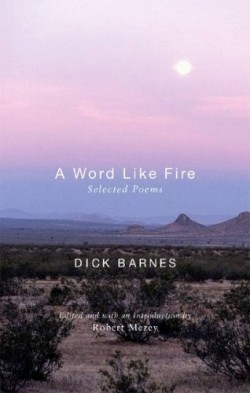A Word Like Fire
Selected Poems
American poetry is always the better for the likes of poets such as this one, late of “the wilds of eastern California,” as he called it. Born in San Bernardino, Barnes grew up in small towns among the San Bernardino Mountains and out on the Mojave Desert, and died in 2000 at the age of sixty-seven. Along the way, he cobbled together a splendid reputation as a scholar and teacher, specializing in Medieval and Renaissance literature; but he wasn’t one to barricade himself in the classroom. Barnes also worked as a musician, dramatist, filmmaker, editor, and translator. Poetry, though—love of it and of the making of it—was his vocation, and everything else took a back seat.
Several things are quickly apparent in this collection. For one, Barnes loved people. He was a true humanist in every sense of the word. Poems about family, neighbors, colleagues, and strangers abound with insight and feeling, and he was a superb elegist. For another, he was heartsmitten with the Mojave Desert and its environs, where he spent so much of his life. The desert’s enduring beauty can be austere or extravagant, often somehow managing to be both at once, and this quality can be seen throughout Barnes’s work.
An advantage to being a regional poet (a title which should never be seen as pejorative) is the gift of opportunity the poet has to fully invest the poems with a sense of what is unique to the familiar landscape in all its nuance and shade. Barnes does this to near perfection. Take “A Lake on the Earth: The Swarm,” in which he describes the sudden eruption, “repeated without variation since the Triassic,” of multitudes of nearly invisible crustacea brought to life simply by the heavens pouring water into a dry lakebed: “there is another movement in it, innumerable tiny things touching the surface everywhere / as if a fine rain were still falling … / What beguiles us is precision, how eggs by themselves can measure rain just enough / to begin that great throb of life that has to go all the way … their only element / this thin layer of water they stir between earth and air.”
These poems never declaim and never suffer from pedantry. Barnes’s syntax is easy on the ear, and his diction stays close to that of the farmers and trappers he grew up with. The selection was edited with care, and the editor supplies an almost too-adulatory foreword (Mezey and Barnes were close; together, they spent twelve years translating the poems of Jorge Borges).
In life, Dick Barnes invested much more devotion to writing poems than to gaining notoriety through them. One hopes the publication of A Word Like Fire will correct this injustice.
Reviewed by
Ralph Culver
Disclosure: This article is not an endorsement, but a review. The publisher of this book provided free copies of the book to have their book reviewed by a professional reviewer. No fee was paid by the publisher for this review. Foreword Reviews only recommends books that we love. Foreword Magazine, Inc. is disclosing this in accordance with the Federal Trade Commission’s 16 CFR, Part 255.

